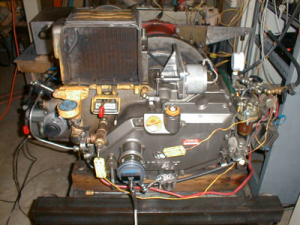Effect of Oxygenated Cetane Improver on Diesel Engine Combustion and Emissions
Student: Howard Hess
Sponsor: Air Products and Chemicals, Inc., Program Manager – Peter J. A. Tijm
Objective: To compare combustion and emissions impacts of incorporating various oxygenates into diesel fuels.
Approach: The primary oxygenated fuel additive of interest in this study is CETANERTM, which is produced by Air Products and Chemicals, Inc. from dimethyl ether through an oxidative coupling process. We are considering this additive and other oxygenates in our Yanmar IDI single-cylinder engine and the VW TDI 1.9L turbo diesel. Total particulate, particulate composition, CO, NOx and total hydrocarbon emissions are monitored for a base diesel fuel and for the fuel containing various oxygenate concentrations (typically at or below 4 wt% oxygen).
Results: In the experimental work completed, several oxygenates have been blended with a premium diesel fuel to yield an oxygen content of 4 wt% in the fuel blend. Results have shown that with these blends, particulate emissions can be reduced by as much as 28% when compared to premium diesel fuel.
Related Publications: Hess, H. S., M. A. Roan, S. Bhalla, S. Butnark, V. Zarnescu, A. L. Boehman (2), P.J.A. Tijm, F. J. Waller. Reduction of Particulate Emissions from a Single-Cylinder IDI Engine with Oxygenated Diesel Fuels. Accepted for inclusion in a book based on the Symposium on the Chemistry of Diesel Fuel, held at the 1998 ACS National Meeting, Boston, August 1998. Litzinger, T., M. Stoner, H. Hess and A. Boehman. Effects of Oxygenated Blending Compounds on Emissions from a Turbo-charged Direct Injection Diesel Engine. International Journal of Engine Research, 1, 57-70 (2000). Hess, H.S., E. M., J. Szybist, A.L. Boehman, P.J.A. Tijm and F.J. Waller. The Use of CETANERTM for the Reduction of Particulate Matter Emissions in a Turbocharged Direct Injection Medium-Duty Diesel Engine. Society of Automotive Engineers Technical Paper No. 2000-01-2886 (2000).

